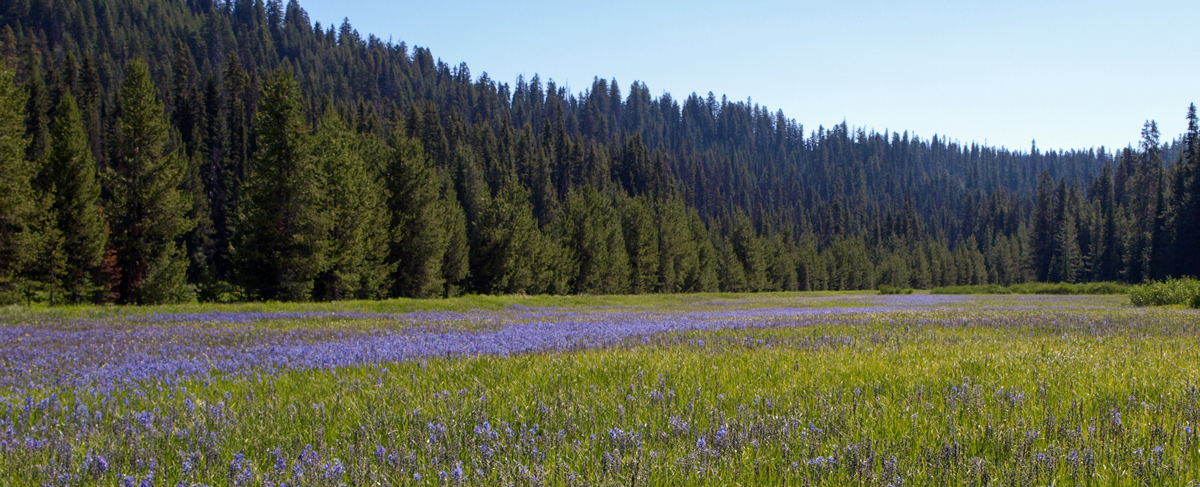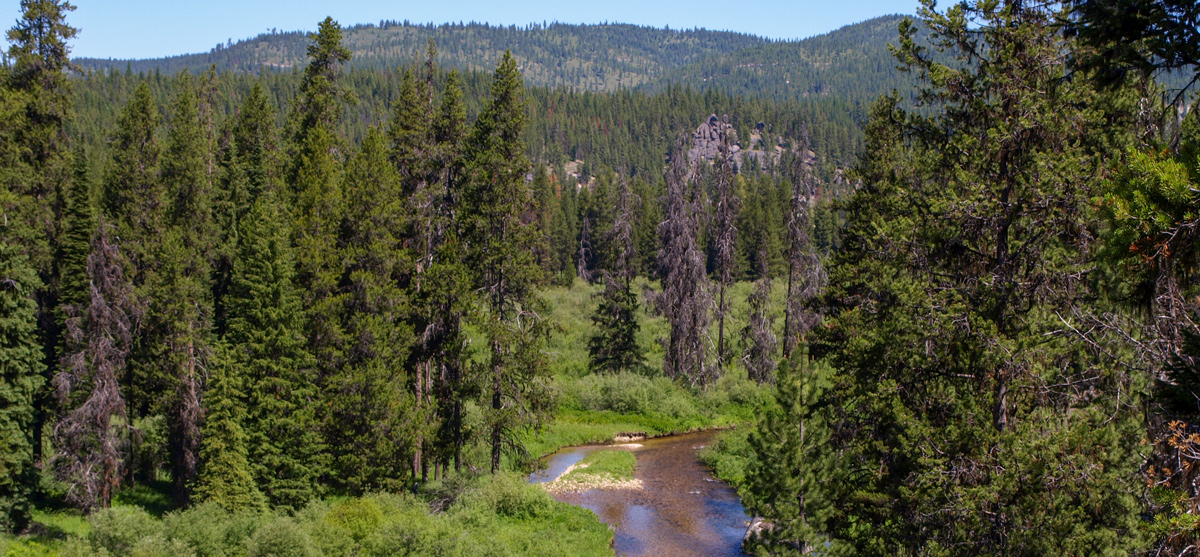At Packer Meadows, they enjoy a midday break surrounded by camas blossoms. They then leave the Bitterroot Mountains along the Northern Nez Perce Trail. At present Lolo Hot Springs, the captains enjoy a hot bath.
A Lolo Hot Springs Bath
by Yellowstone Public Radio[1]Originally aired weekdays by Yellowstone Public Radio during the Bicentennial observance of 2003-2006. Narrated by Hal Hansen. Scripts by Whit Hansen and Ed Jacobson. Produced by Leni Holliman. © … Continue reading
Leaving the Bitterroots
we pursued the hights of the ridge on which we have been passing for several days; when we decended from this ridge we bid aideu to the snow. near the river we fund a deer which the hunters had killed and left us. this was a fortunate supply as all our oil was now exhausted and we were reduced to our roots alone without salt.
—Meriwether Lewis
Camas Blooms at Packer Meadows
© 1 July 2009 by Kristopher K. Townsend. Permission to use granted under the Creative Commons Attribution-Share Alike 4.0 International license.
Lunch at Packer Meadows
at noon we arrived at the quawmas flatts on the Creek of the same name and halted to graize our horses and dine having traveled 12 miles. we passed our encampment of the [13th] of September at 10 ms. where we halted there is a pretty little plain of about 50 acres plentifully stocked with quawmash and from apperances this fromes one of the principal stages or encampments of the indians who pass the mountains on this road.
—Meriwether Lewis
Supper Arrives Late
late in the evening Jo. Field & Colter joined us with the lost horses and brought with them a Deer which J. F. had killed, this furnished us with a Supper.
—Meriwether Lewis
Lolo Creek
© 1 July 2009 by Kristopher K. Townsend. Permission to use granted under the Creative Commons Attribution-Share Alike 4.0 International license.
Above: View is downstream with the hot springs below the large rock, Lewis’s “iregular masy clifts,” in the distant center.
Hot Springs Bath
the prinsipal spring is about the temperature of the warmest baths used at the hot springs in Virginia. In this bath which had been prepared by the Indians by stoping the run with stone and travel, I bathed and remained in 19 minutes, it was with dificulty I could remain thus long and it caused a profuse sweat
—Meriwether LewisI bathed and remained in 10 minits it was with dificuelty I could remain this long and it causd a profuse swet.
—William Clark
Weather Diary
State of the weather at rise
Wind at rise
State of the weather at 4 P.M. Wind at 4 P.M. fair S E fair after rain, hail & thunder S E night cold hard frost this morning. the quawmash [Camas] and Strawberries are just begining to blume at the flatts on the head of the Kooskooske [Clearwater]. The Sun flower also just beginning to blume, which is 2 months later than those on the Sides of the Western Mountains near the falls of Columbia [Celilo Falls].
—Meriwether Lewis[2]To assist the reader of this web page, the date column is not presented and some abbreviations have been spelled out.
Experience the Lewis and Clark Trail
The Lewis and Clark Trail Experience—our sister site at lewisandclark.travel—connects the world to people and places on the Lewis and Clark Trail.
Plan a trip related to June 29, 1806:

Packer Meadow is a High Potential Historic Site along the Lewis and Clark National Historic Trail managed by the U.S. National Park Service. The Clearwater National Forest manages the site and the nearby Lolo Pass Visitor Center.
Notes
| ↑1 | Originally aired weekdays by Yellowstone Public Radio during the Bicentennial observance of 2003-2006. Narrated by Hal Hansen. Scripts by Whit Hansen and Ed Jacobson. Produced by Leni Holliman. © 2003 by Yellowstone Public Radio. |
|---|---|
| ↑2 | To assist the reader of this web page, the date column is not presented and some abbreviations have been spelled out. |




